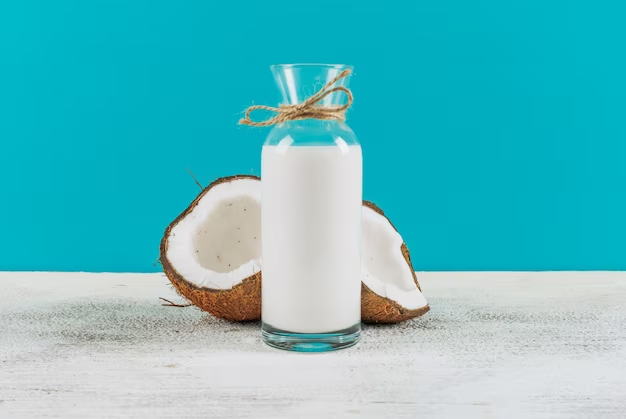
Pressed vs. Regular Coconut Water- Which Reigns Supreme?
Coconut water has gained immense popularity in recent years for its refreshing taste and numerous health benefits. While regular coconut water has been a staple, a newcomer has entered the scene - pressed coconut water. This raises the question: which variant is superior in terms of taste, appearance, and nutritional content? In this nutrient showdown, we'll explore the characteristics of pressed vs. regular coconut water to determine which is better.
What is Pressed Coconut Water?
Pressed coconut water is a relatively new entrant to the market, and its production process sets it apart from the traditional method used for regular coconut water. Unlike the conventional method of extracting coconut water by drilling a hole into the coconut, pressed coconut water is obtained by applying hydraulic pressure to the coconut. This innovative technique claims to yield a higher volume of nutrient-rich water.
The crucial difference between pressed and regular coconut water is that pressed water contains coconut flesh in it, while regular one only contains liquid from the fresh coconut.
The pressed and regular varieties of coconut water exhibit distinct characteristics in both appearance and coconut water taste. Pressed coconut water presents a cloudy, milk-like texture with a robust coconut flavor, while regular coconut water typically appears clear and colorless, offering a neutral to slightly sweet taste.
In terms of nutritional composition, pressed coconut water vs regular coconut water shows slight differences. Pressed coconut water boasts higher levels of calories, carbohydrates, fat, and sugar, but it contains lower amounts of minerals and Vitamin C compared to its regular counterpart.
Notably, pressed coconut water stands out with its low glycemic index and reduced sugar content in comparison to many other beverages and fruit juices. This makes it a favorable choice for individuals with diabetes or those aiming to minimize their sugar intake.
Pressed Coconut Water Uses
1) Hydration: Pressed coconut water, like its regular counterpart, serves as an excellent natural hydrator. Its electrolyte content makes it a popular choice for replenishing fluids after exercise or in hot climates.
2) Culinary Applications: Pressed coconut water can be used in various culinary applications, including smoothies, cocktails, and as a base for sauces. Its subtle flavor adds a tropical touch to both sweet and savory dishes.
3) Mixers and Beverages: The purity and consistency of pressed coconut water make it a preferred mixer for beverages, contributing a natural sweetness with no added sugars.
Pressed Coconut Water Nutritional Facts

Pressed coconut water prides itself on retaining a higher concentration of nutrients compared to regular coconut water. The nutrient profile typically includes essential electrolytes like potassium, sodium, magnesium, and calcium. Additionally, pressed coconut water contains antioxidants, amino acids, and enzymes that contribute to its potential health benefits.
Possessing a low glycemic index, a rarity among packaged beverages, makes it a safe choice for individuals with diabetes as drinks with a high GI can disrupt blood sugar levels. With less than 5 grams of sugar per 100 ml, pressed coconut water stands out for its significantly lower sugar content compared to various beverages and fruit juices.
High in potassium, pressed coconut water plays a crucial role in counteracting the adverse effects of sodium and reducing the risks of blood pressure and coronary heart diseases in middle-aged individuals Additionally, it contains substantial amounts of other minerals and electrolytes, all of which contribute to its proven health-regulating benefits.
Regular Coconut Water Nutritional Benefits
Regular or Fresh coconut water is readily accessible, but it can also be obtained directly from every type of coconut. In many Asian countries, people acquire it by purchasing the fruit, and in some locations, the water is provided at no cost. In contrast, in Western countries, natural coconut water is typically sold independently. However, this does not diminish its freshness or nutritional quality.
Coconut water is rich in antioxidants, which play a crucial role in neutralizing free radicals within the body, preventing oxidative stress that can adversely impact bodily functions.
Although research supporting the potential health benefits of pure coconut water in lowering blood sugar levels has been conducted on diabetic animals, it may hold promise for diabetics.
The antioxidant properties of coconut water contribute to mitigating the risks of various diseases, including psoriasis, thyroid issues, and cancer.
Regular consumption of coconut water has been linked to a reduced likelihood of kidney stone formation.
Additionally, coconut water has demonstrated the ability to decrease cholesterol and triglyceride levels, akin to the effects of statin drugs prescribed for cholesterol management.
Difference Between Pressed And Regular Coconut Water

Pressed vs regular coconut water offers distinct variations in taste, nutritional content, and production processes, providing consumers with choices that cater to different preferences and health considerations.
Pressed coconut water stands out for its extraction method, involving the use of high-pressure processing (HPP) to maintain freshness without compromising nutrients. This technique preserves the natural flavors and nutritional health benefits of coconut water, resulting in a product that often boasts a more vibrant taste compared to its regular counterpart. The process also eliminates the need for heat pasteurization, ensuring a beverage rich in enzymes and electrolytes.
On the other hand, regular types of coconut water undergo traditional pasteurization methods, typically involving heat. While this helps extend shelf life, it may result in a slightly altered taste and a potential reduction in certain heat-sensitive nutrients.
Nutritionally, pressed coconut water is praised for retaining higher levels of antioxidants, enzymes, and electrolytes. Regular coconut water, while still a hydrating option, may experience a minor decline in these components due to the pasteurization process.
Ultimately, the choice between pressed and regular coconut water depends on individual preferences, with pressed varieties offering a premium, unadulterated experience, while regular options provide convenience and a familiar taste.
Difference In Appearance
Regular coconut water often has a slightly cloudy appearance due to the natural presence of coconut pulp or "coconut meat." In contrast, pressed coconut water is slightly clearer and more transparent, as the pressing process effectively removes particles and sediments.
Difference In Taste
The taste of coconut water is subjective, and preferences vary. Regular coconut water may have a more pronounced coconut flavor with subtle sweetness, while pressed coconut water is often described as having a milder taste, allowing the natural sweetness of coconuts to shine through.
Nutritional Difference
Pressed coconut water claims to have a higher nutritional content, thanks to the pressing method. While both variants offer essential electrolytes, pressed coconut water may have slightly elevated levels of antioxidants and enzymes, providing potential additional health benefits. Let us look at the chart below.
|
Nutritional Facts |
Pressed Coconut Water |
Regular Coconut Water |
|
Calories |
25 kcal |
19 kcal |
|
Sugar |
4.17 gm |
2.61 gm |
|
Protein |
0 gm |
0.72 gm |
|
Calcium |
15 mg |
24 mg |
|
Carbohydrates |
5 gm |
3.71 gm |
Read more: What are the benefits of taking a multivitamin daily?
Pros And Cons Of Pressed Coconut Water vs. Regular
Pros:
-
Enhanced Nutrient Content: Pressed coconut water is an excellent form of coconut water that has a richer nutritional profile, offering more antioxidants and enzymes that may contribute to overall well-being.
-
Clarity and Purity: The pressing process results in a clearer and more transparent liquid, eliminating particles and sediments present in regular coconut water.
-
Versatility in Culinary Applications: Pressed coconut water's subtle taste makes it a versatile ingredient in various recipes, enhancing both sweet and savory dishes.
Cons:
-
Limited Availability: Pressed coconut water may not be as widely available as regular coconut water, limiting access for consumers in some regions.
-
Cost: The production process for pressed coconut water may be more resource-intensive, potentially resulting in a higher cost compared to regular coconut water.
-
Subjective Taste Preferences: Some consumers may prefer the distinct taste of regular coconut water, finding pressed coconut water's milder flavor less appealing.
Crack Open the Winner: Pressed Coconut Water – A Conclusion Worth Tasting!
In terms of appearance, taste, and aroma, pressed coconut water and regular coconut water display noticeable distinctions. However, when it comes to nutritional content, the variations are not substantial.
Pressed coconut water caters to those who prioritize flavor over nutritional considerations. Its enhanced palatability makes it an excellent choice for mixed beverages and recipes, although incorporating it as an ingredient may introduce additional fat calories.
On the other hand, regular coconut water is better suited for athletes and fitness enthusiasts who emphasize hydration and electrolyte replenishment over taste. It also serves as a preferable option for individuals aiming to manage their weight, given its lower caloric and fat content compared to pressed coconut water.
Nonetheless, the nutritional variances between pressed vs regular coconut water are minimal, and the added fat calories are relatively inconsequential within the context of the recommended daily allowance. Unlock your potential with Arms Race Nutrition supplements – the synergy your body craves! Our carefully crafted health stacks and protein supplements are your ticket to peak performance. Elevate every workout, recover faster, and achieve results that speak volumes. Your journey to excellence starts here!
FAQs About Pressed vs Regular Coconut Water
1) What are Storage and Shelf Life Guidelines for Fresh Coconut Water?
Freshly extracted coconut water is best consumed within a day to prevent spoilage. Unopened coconut water can be stored in the refrigerator for up to 6 months. Once opened, it is advised to consume within a week.
2) What is the Flavor Profile of Regular Coconut Water?
Regular coconut water boasts a delightful and fresh taste accompanied by a nutty flavor. Generally, it has a neutral to sweet taste, but direct consumption from the coconut may reveal a slightly sour note. The taste may vary depending on factors such as the location of the palm tree's growth, soil salinity, climate, and proximity to the sea.
3) Mention the Common Uses of Regular Coconut Water
Regular coconut water finds diverse applications, including:
- Rehydration for endurance sports athletes or sports players, owing to its high potassium content replenishes electrolytes.
- Consumption as a refreshing beverage.
- Mixing with fruit juices.
- In cocktails and mocktails.
- Incorporation into smoothies.
- A key ingredient in certain curry recipes.
4) Which Is Healthier: Pressed Coconut Water or Regular Coconut Water?
To address this question accurately, let's first summarize and review some key points mentioned above.
Glycemic index: Both pressed coconut water and the regular variety have a low glycemic index, but for the sake of argument, regular water has a lower value.
Calorific value: Regular coconut water is essentially the liquid extracted from the coconut fruit, while pressed coconut water includes the fruit pulp. This is one reason why pressed coconut water has a higher calorie content compared to regular coconut water.
Carbohydrate, Fat, and Sugar: Pressed coconut water has a greater carbohydrate content and contains a small amount of fat, whereas regular coconut water is fat-free. Pressed coconut water also has higher natural and added sugar levels, contributing to its distinct sweet and savory taste. Although the difference from the regular version is not substantial, it becomes significant with multiple servings of pressed coconut water.
Nutrition: While both types of coconut water offer modest amounts of nutrients, regular coconut water holds an advantage in this area.

